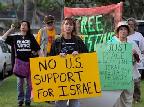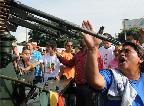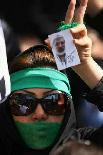The World in Crisis
Summer 2010 (New Politics Vol. XIII, No. 1, Whole Number 49)
The world is in crisis.
New Politics is pleased to publish a set of articles that offer insights into some of the world’s major conflicts.
We present three analyses of Iran’s democratic movement, with articles by Yassamine Mather, Negar Mottahedeh, and Danny Postel. There’s been sharp debate on the Left in Pakistan regarding that country’s campaign against Islamic militants; Pervez Hoodbhoy and Adaner Usmani offer contending views. Stephen R. Shalom discusses Obama and Israel-Palestine. Adrienne Pine writes on the twin crises in Haiti and Honduras. Steven Fake and Kevin Funk address the situation in Darfur, and Sudan more generally. And Derrick O’Keefe puts forward a critique of the foreign policies of the Obama administration from a Canadian perspective.
We hope that these articles will help make sense of these different conflicts, and encourage appropriate political action.
— STEPHEN R. SHALOM AND JOANNE LANDY
In this symposium:
By: Derrick O'Keefe

Canadian author Margaret Atwood famously described the border between our country and the United States as the world’s longest “one-way mirror.”
By: Pervez Hoodbhoy
The left has always been a marginal actor on Pakistan’s national scene. While this bald truth must be told, in no way do I wish to belittle the enormous sacrifices made by numerous progressive individuals, as well as small groups. They unionized industrial and railway workers, helped peasants organize against powerful landlords, inspired Pakistan’s minority provinces to demand their rights, set standards of writing and journalism, etc.
By: Adaner Usmani
It would hardly be an exaggeration to suggest that, today, in the baleful shadow of the Great War on Terror, one central site of intra-progressive discord has been the question of the broad Left’s relation to political and militant Islam.
By: Stephen R. Shalom

During the 2008 presidential campaign, Barack Obama was accused of palling around with terrorists.
This Republican canard was focused on the former Weatherperson, Bill Ayers, but also on Rashid Khalidi, the respected Palestinian-American scholar who had been a friend of Obama’s in Chicago.
By: Steven Fake, Kevin Funk
The emergence of Darfur as a cause célèbre in the West has been one of the more notable propaganda achievements in recent memory. Though the Darfur region of Sudan has been the scene of great human suffering, a death toll of perhaps 300,000 and a population of displaced persons numbering well over 2 million qualifies Darfur as serious but — regrettably — hardly unique for the scale of its violence in the first decade of the 21st century.
By: Adrienne Pine

From the perspective of Honduran and Honduranist scholars, the most common reference to Haiti is as a point of hemispheric comparison. Whether measuring GDP per capita, state legitimacy and citizens’ political tolerance, or corruption, the phrase “Honduras ranks last…after Haiti” seems to be de rigueur. This is no coincidence: the policies and structures that have effected extreme poverty and highly concentrated wealth in both places are very much connected.
By: Danny Postel
A year has now passed since the explosive appearance of Iran’s Green movement in June 2009. Suspecting malfeasance in the official tally of the country’s June 12 presidential election, millions of Iranians took to the streets. The historian Ervand Abrahamian, author of the classic Iran Between Two Revolutions, described the silent rally of June 15 at Azadi (Freedom) Square in Tehran (London Review of Books, 7/23/09):
By: Yassamine Mather
Recent news about Iran has been dominated by U.S. attempts to increase sanctions, and one could be forgiven for thinking the world hegemonic capitalist power is preparing war against a major nuclear power. The reality is far different: all the fuss is about a country where nine months of mass protests have not only weakened the state but also divided the ruling circles, making reconciliation at the top impossible.
By: Negar Mottahedeh

The Persian language blogosphere is rich, varied, and dynamic. Of the 100 million blogs registered around the world in 2005, 700,000 were Persian language, either inside Iran or in the diaspora. Of these, over 60,000 are updated frequently. With over 20 million Iranians connecting to the internet, and over 600,000 Iranians signed up on Facebook by the presidential election of the summer of 2009, the Iranian cyber community is by far the most dynamic such community in the Middle East, and one that is unambiguously diverse.






Leave a Reply